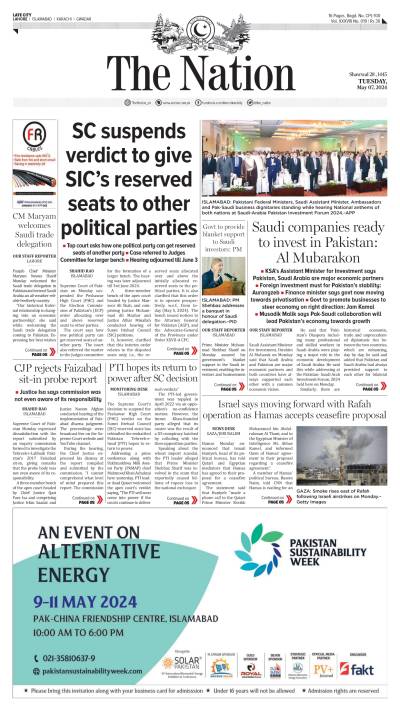SEOUL - South Korea’s conservative ruling party was set to win Wednesday’s legislative election, a key test of sentiment before December’s presidential vote, according to a TV projection.
With more than 90pc of ballots counted, state broadcaster KBS forecast 152 seats for the New Frontier Party (NFP) in National Assembly. It predicted 128 for the opposition centre-left Democratic United Party (DUP), which had been tipped to score an easy victory in earlier opinion polls.
“The DUP failed to turn public calls for punishing the... ruling party into reality. We apologise for disappointing (supporters),” DUP secretary general Park Sun-Sook told reporters, effectively conceding defeat.
“We will sincerely think over what today’s election means and try ceaselessly to be reborn as a party the people can lean and rely on,” she said.
The election was seen as a test for presidential hopefuls. It will be the first time for two decades that the presidential and parliamentary elections fall in the same year.
The ruling party had struggled to preserve its parliamentary majority to pave the way for a second successive presidential victory in eight months’ time.
It had 165 seats in the outgoing parliament against 89 for the DUP.
The outcome is expected to bolster the position of NFP leader Park Geun-Hye, a presidential hopeful. President Lee Myung-Bak cannot constitutionally stand for a second term.
Park has tried to rebuild the NFP since she took over last December.
The ruling party ditched its old name of the Grand National Party and moved to the left to try to shake off its image as a party for the rich. It pledged to improve state welfare programmes.
The NFP almost swept Park’s regional base of southeastern Gyeongsang provinces while DUP candidates were outstanding at their home base of southwestern Jeolla provinces.
“Today’s voting revealed strong regionalism, which had weighed heavily in previous elections,” Kyung Hee University professor Kim Min-Jeon told KBS.
Turnout was 54.3 percent compared to 46.1 percent four years ago, according to election officials.
With economic concerns sidelining worries over North Korea, the DUP tried to exploit discontent over rising prices, high education and housing costs, job difficulties, a widening income gap and a weak welfare system.
The ruling party depicted its opponents as socially divisive and bent on undermining a decades-old security alliance with the United States, particularly through their vow to renegotiate a recently ratified free trade deal with the US.
North Korea’s impending rocket launch is the focus of international attention but has barely figured in the election campaign in the South, which is used to tension with its communist neighbour.
Pyongyang, nevertheless, has repeatedly urged South Koreans to vote out the conservatives who scrapped a cross-border aid and engagement policy.
“Young voters, students and people must deliver a crushing defeat to the traitors,” the ruling party daily Rodong Sinmun said.
The parliament will have 246 directly contested seats and 54 proportional representation seats, allocated according to the total number of votes parties receive nationwide.
Wednesday, May 08, 2024
S Korea ruling party set to win election
From Regent park to Blavatnik; change in making
10:52 PM | May 07, 2024
Anwarul Haq Kakar, Faisal Vawda to sit on independent benches in Senate
8:24 PM | May 07, 2024
PTI demands judicial commission on May 9 incidents
8:23 PM | May 07, 2024
Hapless farmers still await govt nod for wheat purchase
8:19 PM | May 07, 2024
PTI founder declines to meet Sher Afzal Marwat
8:18 PM | May 07, 2024
Northern Horizon
May 07, 2024
OIC’s Voice
May 07, 2024
Regional Revival
May 07, 2024
Gaza to Kashmir
May 06, 2024
Auto Price War
May 06, 2024
Feast and famine
May 07, 2024
Streets of fear
May 07, 2024
Agricultural renaissance
May 06, 2024
Rising hostilities
May 06, 2024
Empress reborn
May 06, 2024
ePaper - Nawaiwaqt
Advertisement
Nawaiwaqt Group | Copyright © 2024





